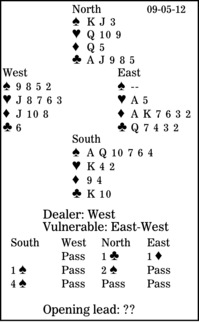Bridge column, September 5: Tricks won went from nine to 12

This deal from a duplicate presents a mysterious puzzle. All six tables played in four spades by South. Three declarers won nine tricks, one made 10, and two took 12. How come?
This auction looks normal, but East might have rebid three clubs. What should West lead against four spades?
The two declarers who won 12 tricks received a club lead, with East incorrectly putting up the queen. The six-lead must be a singleton, given North's opening and East's having bid diamonds. East should play low. Then South can be held to 10 tricks.
The other Wests led the diamond jack, East taking two tricks in the suit. Two defenders now played the ace and another heart, South claiming.
One East shifted to a low club. Declarer won with his 10, drew trumps, and led the club king, getting the bad news. Now he erred, playing a heart to dummy's queen. East won and returned a heart to defeat the contract. For his bidding, East had to have the heart ace. South should have overtaken the club king with dummy's ace and called for the heart nine. When East played low, declarer would have had to guess who held the jack. But at least he would have had a chance to get it right.
Don't play third hand high when it cannot help your side.
** ** **
COPYRIGHT: 2012, UNITED FEATURE SYNDICATE
DISTRIBUTED BY UNIVERSAL UCLICK FOR UFS

